Watch live as our experts answer your questionspublished at 10:46 BST 30 May

You can now follow along live as our experts answer your questions on the vape ban.
Just click the Watch live button at the top of the page.
Our experts have addressed your questions and comments ahead of a ban on the sale of disposable vapes in the UK from Sunday
We heard about whether there were any plans to ban vape use in public places and if disposable pods could still be used
The head of the UK Vaping Industry Association tells the BBC it's "ill-thought-out" legislation - but ministers say the ban will cut environmental waste and reduce vaping among younger people
"The amount of littered vapes is disgusting," one woman told the BBC, but another said he'll just use reusable vapes instead
The companies behind disposable vapes have been working on new reusable products ahead of the ban
Edited by Barbara Tasch and Imogen James

You can now follow along live as our experts answer your questions on the vape ban.
Just click the Watch live button at the top of the page.
Part of the reasons vapes are being banned is because of their risk of starting fires.
They contain lithium ion batteries, which are being discarded and then setting on fire as the chemicals within them are highly flammable.
Nature Minister Mary Creagh says disposable vapes cause 1,200 fires annually.
A waste company loader told the BBC that he has witnessed two fires as a result of vapes being found in the wrong bins, setting fire to the lorry.
Sean Holness added that there have been several more fires at work in the past year or two, compared to when he started with the firm eight years ago.
And recently Slough Borough Council had to urge people to thrown them away correctly, after a bin lorry caught fire, leading them to dumping five tonnes of rubbish.
Egzon in Hereford tells BBC Radio 5 Live that he agrees that disposable vapes "need to go".
He has run a vape shop for seven months, and in this time has collected hundreds of disposable vapes while encouraging customers to buy reusable devices.
"This has to be licensed, a vape store should have a license," he says.
He used to be a smoker, and now he vapes he feels "so much better", but he doesn't want people who don't smoke to begin vaping.
On the other side, Jen in Sheffield says "heck yeah" when asked if she's a vape fan. She went on the NHS scheme to stop smoking, but has allergic reactions to nicotine patches, so she ended up vaping.
She acknowledges she is addicted to vaping, but says it doesn't "hurt anybody".
"People need to be more responsible of what they're disposing," she argues, and says the government could instead support parents in helping children stop vaping.
 Imogen James
Imogen James
Live reporter
We've been talking you through the upcoming vape ban this morning.
The disposable, single-use products are being made illegal from Sunday across the UK, as the government attempts to crack down on negative environmental impacts and the high-levels of young people vaping.
Soon, it'll be over to you, as we have our experts ready to answer your questions on the ban. They will be live at the top of this page from 10:30, which you can see by clicking Watch live.
 Peter Gillibrand
Peter Gillibrand
BBC Newsbeat

Kian Watt, 18, tells me: "I love vapes", as he shows off his large purple grape vape.
"Banging flavour," he adds.
"Everyone my age vapes" the teen explains. He started vaping at 12-year-old because of "all the stress".
Now he finds his "lungs and health could be miles better if I wasn't vaping" but he says he would get sweaty and stressed out if he quit the habit.
"Vapes should not be banned, because it actually does help certain people get through the day," he says passionately.
Instead, they should be focusing on the shops selling vapes to underage people, he argues.
In the last few years there's been a huge rise in youth vapers and non-smokers taking up vaping, Linda Bauld, professor of public health at Edinburgh University tells BBC Radio 5 Live.
She says it's good that the government is working on further regulations around advertising and flavours, but "we don't want to completely remove these devices" as they're useful to smokers.
Adult smoking is still at 14% so there is a "long way to go", Bauld says, but there are other ways to quit smoking.
For those who are "nicotine naïve and non-smokers" the health impacts of vaping are not clear yet, so people should be cautious, she adds.
The sheer volume of vapes being produced, and then thrown away, means most are not recycled properly.
People still in possession of disposable vapes after the ban comes into effect should either return them to the vape supplier who can then recycle them, or check to find a local recycling point. , external
This is the best way to get rid of them, causing minimal impact on the environment and curbing the risk of fire.
Recycling these items is tricky, as they contain a variety of chemicals and aren’t designed to be picked apart.
They are typically disassembled by hand, a slow and difficult process, which struggles to keep up with the amount being disposed.
The lithium batteries can then be repurposed, for things such as electric cars. The rest of the plastic fragments and metals are cleaned, and can be sent off to be processed or to smelters.
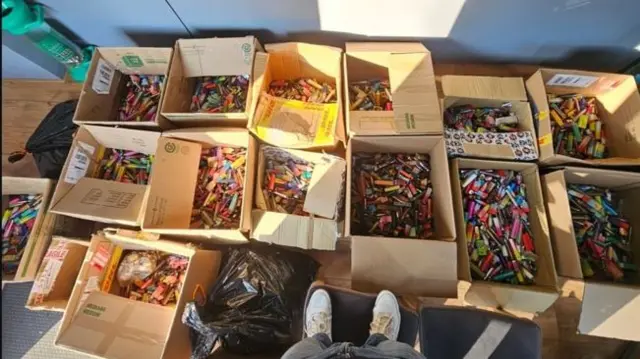 Image source, Pete Kingsman
Image source, Pete KingsmanPete Kingsman owns vape shop Clever Panda Vapes in Aylesbury, England.
He’s not worried about the upcoming ban “in the slightest”, saying "people will just move over to a different device."
As for the ban, he’s “on the fence” - anything to stop children vaping is good, he says, but "whether I think it's going to work or not is a totally different ball game."
But he's positive that it will reduce waste.
His company recycles all the products, and he tells me there is currently no free service for this. He pays £3 per kilo to recycle them. Currently, he’s got around 200 kilos of empty vapes to dispose of.
“As a small family run business, that cripples us, it is a big problem. We feel the cost of this but because we’re part of the problem, we’re part of the solution.”
And the ban repercussions aren’t strong enough for him, as he argues for licences to be put in place.
"Until that happens I don't see a huge amount actually changing," Kingsman adds.
Should vapes be banned as a whole? That's what BBC radio presenter Nicky Campbell is asking audiences this morning.
He is live on BBC Radio 5 Live now getting the reaction from the public.
You can follow along by clicking Watch live at the top of this page to see Nicky in action, and we'll bring you text updates here.
Ben King
Business reporter, BBC News
The vape companies are very inventive, bringing out new products all the time, and they haven't sat still since the ban was announced.
The two leading makers, Elfbar/Lost Mary and SKE, brought out new products which look the same as their most popular disposable products, and cost about the same.
But they have replaceable pods and charging points, so they count as reusable.
So one of the big questions about the ban is this - will lots of vapers treat the new products like the old disposables, and throw them away after one use?
If so, the problems of litter and waste won't be solved.
 Imogen James
Imogen James
Live reporter
Salim Kalache, 24, tells me he goes through six vapes a week. He’s only vaped for around four months, but chose to take it up instead of smoking.
“Vaping is apparently a lot better for your teeth. It doesn’t seem to be as likely to cause cancer either,” he explains. He also says it’s nicer to not smell like cigarettes.
But, he warns: “It’s the lesser of two evils”. On the ban, he says it’s “fair”.
His wastage in the past few months has seen him manage to “fill a carrier bag with the vapes I’ve gone through”. He’s keeping it under his bed because he’s “putting off” taking it to the nearest recycling point.
Despite his positive attitude toward the ban, Kalache says he’s probably “not going to stop or slow down - I’ll just get a reusable version” of the vapes he uses.
 Image source, Salim Kalace
Image source, Salim Kalace Peter Gillibrand
Peter Gillibrand
BBC Newsbeat

The chief executive of vaping firm Totally Wicked, Marcus Saxton, says "not all is lost" in the face of the upcoming ban.
He plays a role in the association that works with policy makers to try and give them advice over this guidance, and has been helping the government to "try and get the balance right".
At this stage, he thinks it is the "right thing", as opposed to his opinion at the beginning, when he worried that the black market would instead take over.
He tells people to go to reputable shops to get a good value vape, which are being tested and legal.
Now businesses need to box up and send off disposable vapes that are left over so they can be disposed of properly, he adds.
The problem is that a lot of people are not recycling them responsibly, he adds.
For two years they've had a recycling programme in place, he explains, but not enough shops are doing this.
He also thinks trading standards don't have the capacity to deal with the ban.
"If we stop at the ban, pause, understand the impacts... before chasing the next thing, that's really important," he says.
The main difference between the banned vapes and the ones that will remain legal is that they are reusable.
They are designed with different features, which ensures they can be used again and again. This includes a refillable element, and a charging port.
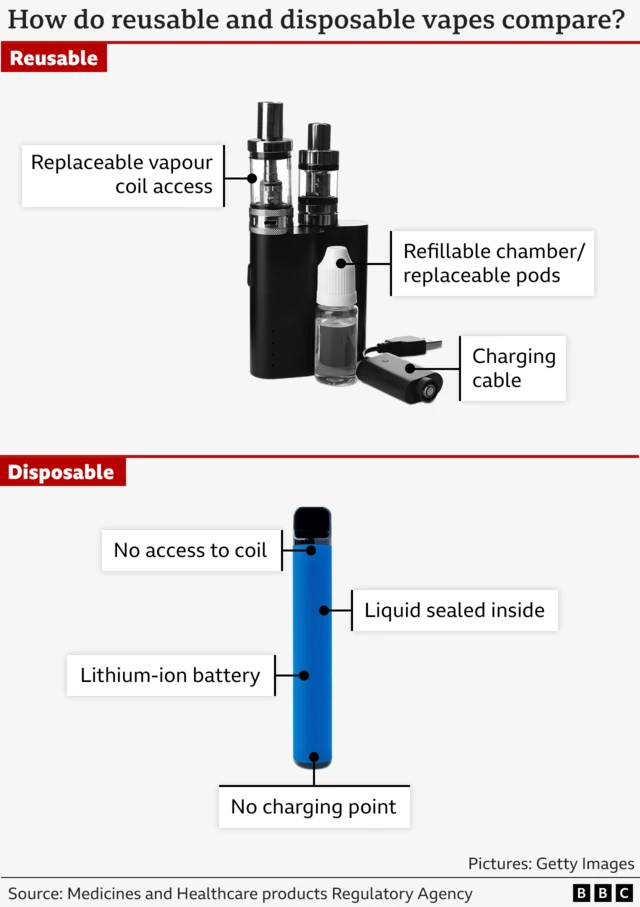
 Jordan Kenny
Jordan Kenny
BBC Newsbeat politics reporter

Nature Minister Mary Creagh has been instrumental in pushing the ban.
She is an ex-smoker, and acknowledges that vapes can help people quit smoking, but she says she doesn't want a new generation to get into vaping.
She says there's around eight million disposable vapes thrown away per week - that's 13 a second - causing 1,200 fires annually.
On enforcement, she says Trading Standards officers have been given an extra £10m as they hire more staff.
They will go out from next week, checking if people are still selling the vapes. There's an immediate on-the-spot fine, followed by tougher fines and ultimately a prison sentence.
Shops have had since January to stop buying stocks and to get rid of the items they already have, she says, when pushed on them not having much time.
Creagh also addresses the issues of the many vapes that have added in a charging point - and people still throwing them away despite being reusable - "clearly we need to look at how these products are regulated," she says, calling it a "products and design" issue.
The government will take further action if they need to, she adds.
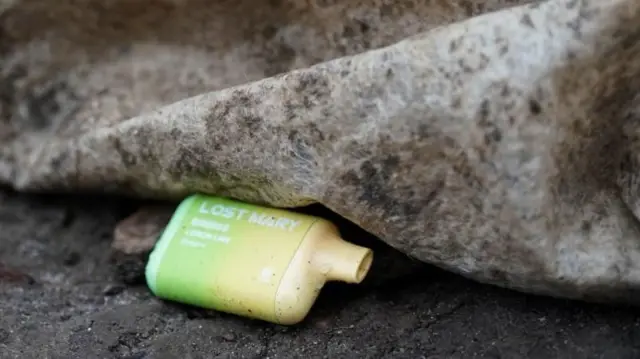 Image source, PA Media
Image source, PA MediaHave you walked past a bin lately and wondered what those little white stickers put all over it are?
Well, those come on the bottom of vapes, and are one of the first things to be disposed of when opening a new vape.
It’s not the only waste though, there’s usually a cardboard box, a plastic wrapping and a small plastic covering over the mouth piece.
All can be disposed of properly, but a glance at most high streets show you they aren’t.
Then there's the actual vape, which contain very harmful chemicals. Millions are thrown away annually.
The government Department for Environment, Food and Rural Affairs (Defra) has explained how damaging , externalthis can be for the environment.
According to Defra vapes can be mistaken as food, meaning animals ingest poisonous chemicals. And if vapes are thrown in a bin or sent to landfill, they still release substances such as lead and mercury into soil, rivers and streams, damaging habitats.
Then come the microplastics, which can enter food chains because the vapes don’t break down, they just turn into tiny pieces of plastic.

The disposable vape ban is looming, so we want to hear from you.
What would you like to know about the ban? How do you feel about it? Our experts will be here to answer your questions.
You can get in touch in the following ways:
Please read our terms & conditions and privacy policy.
In some cases a selection of your comments and questions will be published, displaying your name and location as you provide it unless you state otherwise. Your contact details will never be published.
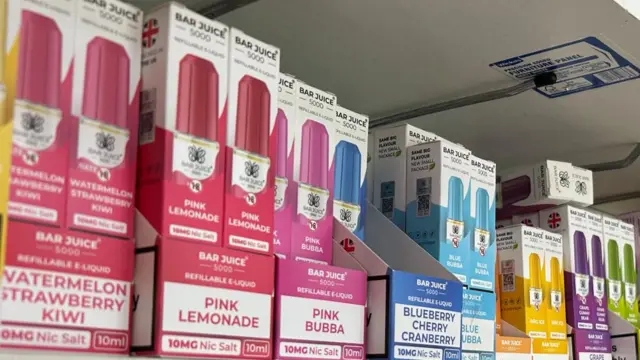
The head of the UK Vaping Industry Association tells the BBC's Today programme that the ban on disposable vapes is "ill-thought-out" legislation.
John Dunne says rules should have been implemented to increase the tank size of refillable vapes and efforts made to make them easier to refill. He fears some customers will just continue to use smaller refillable vapes as disposables as they remain so cheap.
Dunne insists more should be done to change consumer behaviour through education and to invest in better ways of disposing and recycling of vapes. He also calls for licensing to be brought in for sellers of the products.
Kate Pike from the Chartered Trading Standards Institute for Tobacco and Vaping agrees that the price point for some reusable vapes isn't that different from disposables so worries there won't be a notable environmental benefit if they are still thrown away after a single use.
She adds that the both products also look incredibly similar but is confident that trading standards officers are "geared up for enforcement" from Sunday.
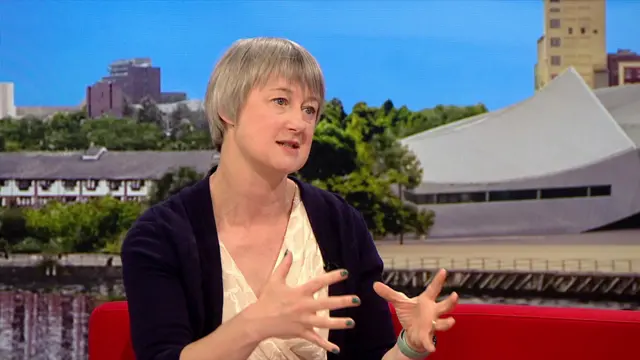
A leading campaigner on tackling smoking tells BBC Breakfast that she is supportive of the upcoming ban on the sale of disposable vapes.
Hazel Cheeseman, chief executive of the charity Action on Smoking and Health, says it's an important regulation for both the environment and to reduce the number of teenagers who vape.
Cheeseman acknowledges the value of vapes in helping some people quit cigarette smoking but says disposable vapes and their colourful packaging and flavours have attracted young customers.
"Teenagers weren't drawn to these products because you could throw them away," she tells BBC Breakfast.
"They were drawn to them because they were brightly coloured, and because they were cheap, and they were really, really available. All of those things will still be true on Sunday."
She concedes that despite the ban, vaping products will still be easily available but hopes it will be an important first step for tougher regulations on vaping products.
She adds: "The manufacturers are not making it easy for people to change their behaviour."
Cheeseman flags that an upcoming Tobacco and Vapes Bill is also aiming to tackle the marketing and branding of vaping products to help reduce their use amongst teens going forward.
There’s a lot of vapes on the market (soon to be a lot fewer). Here’s how to identify a disposable one:
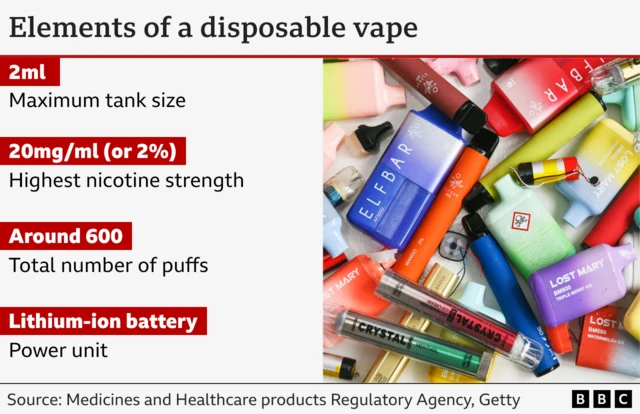
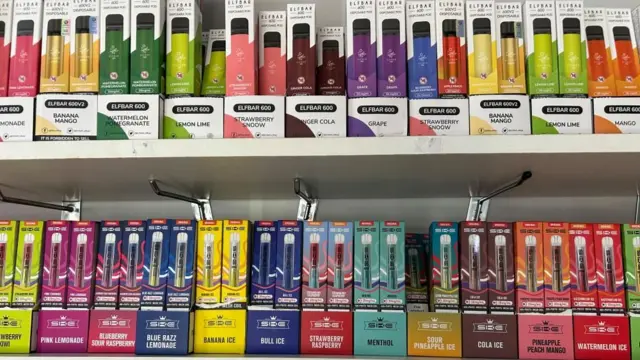
On Sunday, disposable vapes are set to be banned across the whole of the UK.
The measures were introduced in January 2024 by the previous government, and they’re intended to protect children's health and prevent environmental damage.
Shops and businesses will no longer be allowed to stock and sell disposable vapes, as the government says this type of vape is an “inefficient use of critical resources” that are frequently thrown away as litter, or improperly put in non-recycled rubbish.
The guidance also adds that vapes can cause fires, several of which we have reported on. To be considered disposable, a vape wouldn’t have the capacity to be recharged or refilled. It applies to anyone who sells them.
There are different penalties across the four nations, depending on where you live.
This includes a minimum £200 fine for businesses breaking the law in England, and Trading Standards will be able to seize any single-use vapes they find.